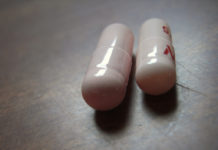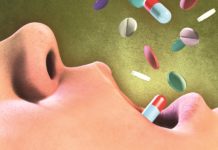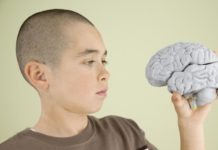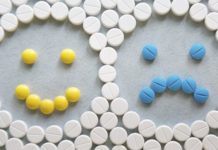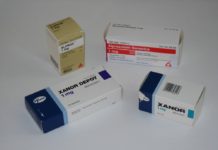Study of Online Antidepressant Forums Reveals Long Lasting Withdrawal Effects
Effects of discontinuing SSRIs and SNRIs reported on an online forum indicate significant and long-lasting withdrawal symptoms.
Antidepressant Use Leads to Worse Long Term Outcomes, Study Finds
Results from a 30-year prospective study demonstrated worse outcomes for people who took antidepressants, even after controlling for gender, education level, marriage, baseline severity, other affective disorders, suicidality, and family history of depression.
Researchers Address Dangers of Polypharmacy and Inappropriate Medication Use
A new special issue brings together articles exploring the harmful effects of simultaneous multiple medication use.
Researchers Warn of “Brain Atrophy” in Children Prescribed Antipsychotics
Researchers discuss the evidence that antipsychotic medications may cause brain atrophy in children, whose brains are still developing.
Treating Metabolic Conditions May Resolve Some Depressive Symptoms
New research suggests that treatable metabolic abnormalities underlie some treatment-resistant cases of depression—and treating the metabolic condition has the possibility of dramatically reducing depressive symptoms
When Psychiatric Medications Cause Psychiatric Symptoms
Dr. Yolande Lucire, a psychiatrist from Australia, recently published a paper about the iatrogenic effects of psychiatric drugs.
More Children Receiving ‘Off-Label’ Antipsychotics for ‘ADHD’
Over the past twenty years, the number of prescriptions for atypical antipsychotics written to children and young adults between four and eighteen has increased...
Researchers: Antidepressant Withdrawal, Not “Discontinuation Syndrome”
Researchers suggest that the pharmaceutical industry had a vested interest in using the term “discontinuation” in order to hide the severity of physical dependence and withdrawal reactions many people experience from antidepressants.
Stimulant Medication Use Linked to Sharp Increase in BMI by Eighth Grade
New evidence suggests that children on ADHD medication may have stunted growth initially but more rapid increases in body mass over time.
Cognitive Impairment from Long-Term Benzodiazepine Use Remains Even After Drug Withdrawal
Long-term benzodiazepine use shown to effect cognitive function during current use and for years after drug discontinuation.
ADHD Drugs Linked to Psychotic Symptoms in Children
Stimulant medications like Ritalin and Adderall, often prescribed to treat children diagnosed with ADHD, are known to cause hallucinations and psychotic symptoms. Until recently these adverse effects were considered to be rare. A new study to be published in the January issue of Pediatrics challenges this belief, however, and finds that many more children may be experiencing psychotic symptoms as a result of these drugs than previously acknowledged.
Tapering Strips Help People Discontinue Antidepressants
A new study by Peter Groot and Jim van Os has found that tapering strips help people successfully discontinue antidepressant medications.
After the Black-Box: Majority of Children Starting SSRIs Still Receiving Too High of Dose
In 2004, the FDA added a black-box warning to SSRI antidepressants on the increased risk of suicide among children taking these drugs. A new study suggests that this warning has increased the proportion of children who begin an antidepressant on a low dose, but the majority are still receiving higher than recommended doses.
New Study Finds Brain Changes in Newborns Exposed to Antidepressants
A fist of its kind neuroscience study, published this month in Cerebral Cortex, found changes in the brain electrical activity of infants exposed to SSRI antidepressants during pregnancy.
Antidepressant Misinformation Promoted on Popular Websites
A new study indicates that popular online resources do not accurately present the scientific evidence on the risks and benefits of antidepressants.
The ADHD Drug Abuse Crisis on College Campuses
The abuse of ADHD drugs on college campuses has reached epidemic proportions, according to the authors of a recent review in the journal of Ethical Human Psychology and Psychiatry. ADHD drugs, like Ritalin and Adderall, have become so commonplace on college campuses that students abusing these drugs for studying, weight loss and partying have underestimated their risks. As a result, we have seen exponential increases in emergency room visits, overdoses, and suicides by students taking these drugs.
New Study Casts Doubt on Efficacy of Ketamine for Depression
A new study, published this month in the Journal of Affective Disorders, investigated the effectiveness of weekly intravenous ketamine injections as a treatment for...
Researchers Find Paroxetine Harms Developing Brain
Researchers at Johns Hopkins test paroxetine on developing brain cells and discover numerous neurotoxic effects.
New Data Show Lack of Efficacy for Antidepressants
An article published this month in the journal BMC Psychiatry suggests that there is a lack of efficacy for SSRIs and that they significantly increase the risk of serious side effects.
Gradual Tapering is Most Successful for Withdrawal from Antipsychotics
Mixed-Methods study explores the experiences of antipsychotic discontinuation among service users.
Benzodiazepines Linked to Treatment Resistant Depression
Prior use of benzodiazepines, such as Xanax, Librium, or Ativan, may increase the risk of treatment-resistant depression (TRD), according to a new study published in The Journal of Nervous and Mental Disease.
Researchers Question Link Between Genetics and Depression
A new study, published in the journal Molecular Psychiatry, found no link between genetics and the occurrence of depressive symptoms.
NICE Guideline Update Acknowledges Severe Antidepressant Withdrawal
A new update to the NICE guideline for depression suggests providers discuss long-term, severe antidepressant withdrawal symptoms.
Initial Trial of Ayahuasca for Depression Shows Promising Results
Ayahuasca found to be effective in treating moderate to severe depression in low-income population.
Antidepressants Worsen Rapid Cycling in Bipolar Depression
-SSRI antidepressant medications contribute to a significant worsening of emotional "rapid cycling" in patients diagnosed with bipolar disorder.


